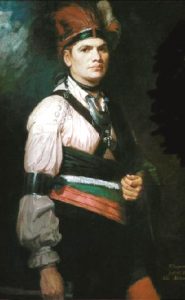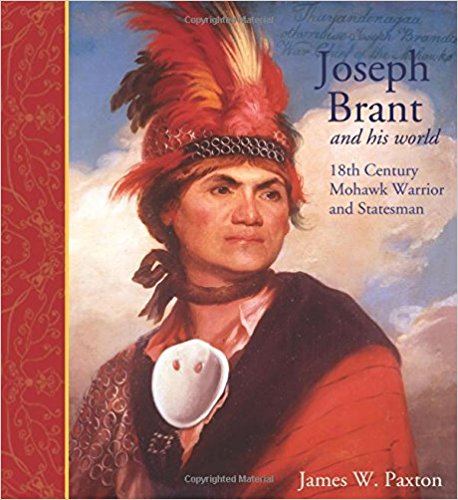“The whole genre of biographies
is problematic”
Book review:
Joseph Brant and His World:
18th Century Mohawk Warrior and Statesman
Toronto: James Lorimer & Company Ltd., 2008.
by Dr. James W. Paxton
Associate Professor of History and Department Chair, Moravian College
B.A., University of Toronto; M.A., Virginia Polytechnic Institute and State University; Ph.D., Queen’s University, Kingston, Ontario
Consider the millions of people who lived in North America before Columbus “discovered” the continent. They were not savages or barbarians—they were human beings living in advanced societies.
The reader cannot doubt that Dr. Paxton respects the vibrant cultures and the cultural heritage of the North American aboriginal peoples who are among his professional interests. As an ethnohistorian, he is careful to consider the cultures of the past, and historical cultural change, in contexts that were a reality for the people who sustained those cultures.
Paxton is Associate Professor and chair of the History Department at Moravian College (Bethlehem, PA). The scope of his professional inquiry includes early America, antebellum U.S. history and the history of North America’s First People. His passion is the cultures—their antecedents, dynamic interactions, and legacies—of the peoples who were Americans before Europeans arrived beginning in the 16th century. Paxton brings candid and eloquent enthusiasm to his work.
I talked with him about this book and his views about writing and understanding history. In part, he is motivated by concern that some historians allow “the cultural assumptions of the West” to shape their understanding and interpretation of the past. Referring to biographies of historical figures, Jamie clarified an element of the ethnohistorical approach to understanding and interpreting history: “We must read a biography in the context of the [subject’s] environment—it’s hard to judge what influenced the subject, we must contextualize the person.” He cautioned that many biographers fall short of this standard (“the whole genre of biographies is problematic”). Many of the existing biographies and treatments of Joseph Brant “offer a flawed framework” of Brant’s life and cultural milieu, emphasizing a popular view that the Mohawk leader was “a man of two worlds,” that is, the respected Mohawk warrior in the Native American milieu and also the potent, Anglicized “Indian” representative who was a confidant of British colonial administrators and a transoceanic traveler who talked with King George III.

Joseph Brant (1776, by George Romney)
In Joseph Brant and His World, Paxton clarifies and expands his own assessment, and his commitment to contextual interpretation: “Brant was fully a Mohawk, but not a Mohawk chief; he was a New World creole, you can’t disentangle the multiple cultures he lived in . . . in aboriginal culture, there was no tradition of coerced leadership, Brant was an orator rather than a statesman . . . his wife was an influential clan mother, he was as much channeling decisions as making decisions . . . Brant’s connection to the British was important—in aboriginal culture, power was in alliances, independence was ludicrous.” Brant was not a simple “cultural chameleon” who could function in distinct Mohawk and British cultures. He was a leader who experienced and helped shape the interaction and evolution of those cultures:
“Joseph Brant was a Mohawk. He embodied the broader changes Mohawks had found useful and necessary to live in a predominantly Anglo-American world. It says much about modern myopia when we fail to note that the Mohawks’ German and Scots-Irish neighbors also found it useful and necessary to learn the Mohawk language and Haudenosaunee rituals. In important ways, the Mohawk and Grand River valleys were not racial frontiers but sites of cultural blending (p. 78).”
Joseph Brant and His World embraces the ethnohistorical commitment to explore and elaborate past cultures and cultural interactions from the point of view of the participants, respecting the milieux they sustained.
* * * * * *
Book review. Copyright © Richard Carl Subber 2023 All rights reserved.
As with another eye: Poems of exactitude with 55 free verse and haiku poems,
and the rest of my poetry books are for sale on Amazon (paperback and Kindle)
and free in Kindle Unlimited, search Amazon for “Richard Carl Subber”
Book review: “Bartleby, the Scrivener”
loneliness beyond understanding…
by Herman Melville
* * * * * *
© 2017 – 2023, Richard Subber. All rights reserved.

0 Comments